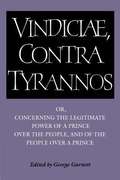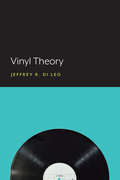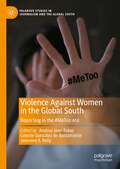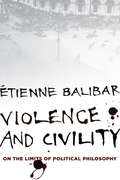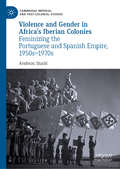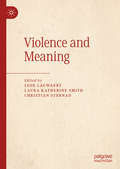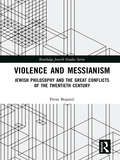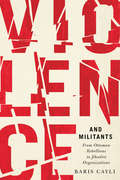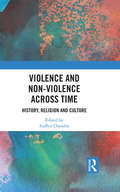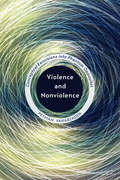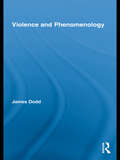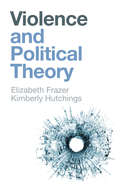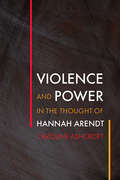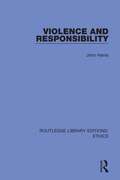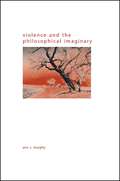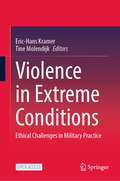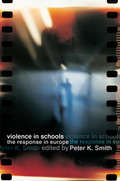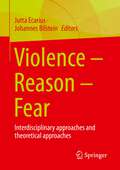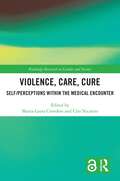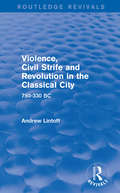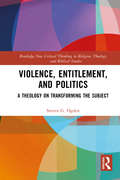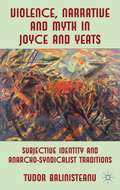- Table View
- List View
Vindiciae, Contra Tyrannos: Or, Concerning the Legitimate Power of a Prince Over the People, and of the People Over a Prince (Cambridge Texts in the History of Political Thought)
by Stephanius Jurius Brutus George S. GarnettThe Vindiciae, contra tyrannos was the most infamous of the monarchomach treatises produced during the French wars of religion. This edition presents the first complete and accurate English translation of the work, a comprehensive apparatus, and an introduction that provides the first detailed analysis of the argument and also reconsiders the much-disputed question of authorship. It will be of interest to a wide range of scholars working on the history of political thought and early modern Europe.
Vinyl Theory
by Jeffrey R. Di LeoWhy are vinyl records making a comeback? How is their resurgence connected to the political economy of music? Vinyl Theory responds to these and other questions by exploring the intersection of vinyl records with critical theory. In the process, it asks how the political economy of music might be connected with the philosophy of the record. The young critical theorist and composer Theodor Adorno’s work on the philosophy of the record and the political economy of music of the contemporary French public intellectual, Jacques Attali, are brought together with the work of other theorists in order to understand the fall and resurrection of vinyl records. The major argument of Vinyl Theory is that the very existence of vinyl records may be central to understanding the resiliency of neoliberalism. This argument is made by examining the work of Adorno, Attali, Friedrich Nietzsche, and others on music through the lens of Michel Foucault’s biopolitics.
Violence Against Women in the Global South: Reporting in the #MeToo era (Palgrave Studies in Journalism and the Global South)
by Andrea Jean Baker Celeste González de Bustamante Jeannine E. RellyBringing together 14 journalism scholars from around the world, this edited collection addresses the deficit of coverage of violence against women in the Global South by examining the role of the legacy press and social media that report on and highlight ways to improve reporting. Authors investigate the ontological limitations which present structural and systemic challenges for journalists who report on the normalization of violence against women in country cases in Argentina; Brazil; Mexico; Indonesia; Kenya, Nigeria, South Africa; Egypt; Libya, Syria, and Yemen. Challenges include patriarchal forces; gender imbalance in newsrooms; propaganda and censorship strategies by repressive, hyper-masculine, and populist political regimes; economic and digital inequities; and civil and transnational wars. Presenting diverse conceptual, methodological, and empirical chapters, the collection offers a revision of existing frameworks and guidelines and aims to promote more gender-sensitive, trauma-informed, solutions-driven, and victim or survivor centered reporting in the region.
Violence All Around
by John SiftonA human rights lawyer travels to hot zones around the globe before and after 9/11 to document abuses by warlords, terrorists, and counterterrorism forces. John Sifton reminds us that human rights advocates can only shame the world into better behavior; to invoke rights is to invoke the force to uphold them, including the very violence they deplore.
Violence and Civility: On the Limits of Political Philosophy (The Wellek Library Lectures)
by Étienne BalibarIn Violence and Civility, Étienne Balibar boldly confronts the insidious causes of violence, racism, nationalism, and ethnic cleansing worldwide, as well as mass poverty and dispossession. Through a novel synthesis of theory and empirical studies of contemporary violence, the acclaimed thinker pushes past the limits of political philosophy to reconceive war, revolution, sovereignty, and class.Through the pathbreaking thought of Derrida, Balibar builds a topography of cruelty converted into extremism by ideology, juxtaposing its subjective forms (identity delusions, the desire for extermination, and the pursuit of vengeance) and its objective manifestations (capitalist exploitation and an institutional disregard for life). Engaging with Marx, Hegel, Hobbes, Clausewitz, Schmitt, and Luxemburg, Balibar introduces a new, productive understanding of politics as antiviolence and a fresh approach to achieving and sustaining civility. Rooted in the principles of transformation and empowerment, this theory brings hope to a world increasingly divided even as it draws closer together.
Violence and Gender in Africa's Iberian Colonies: Feminizing the Portuguese and Spanish Empire, 1950s–1970s (Cambridge Imperial and Post-Colonial Studies Series)
by Andreas StuckiThis book examines how and why Portugal and Spain increasingly engaged with women in their African colonies in the crucial period from the 1950s to the 1970s. It explores the rhetoric of benevolent Iberian colonialism, gendered Westernization, and development for African women as well as actual imperial practices – from forced resettlement to sexual exploitation to promoting domestic skills. Focusing on Angola, Mozambique, Western Sahara, and Equatorial Guinea, the author mines newly available and neglected documents, including sources from Portuguese and Spanish women’s organizations overseas. They offer insights into how African women perceived and responded to their assigned roles within an elite that was meant to preserve the empires and stabilize Afro-Iberian ties. The book also retraces parallels and differences between imperial strategies regarding women and the notions of African anticolonial movements about what women should contribute to the struggle for independence and the creation of new nation-states.
Violence and Meaning
by Lode Lauwaert Laura Katherine Smith Christian SternadThis edited collection explores the problem of violence from the vantage point of meaning. Taking up the ambiguity of the word ‘meaning’, the chapters analyse the manner in which violence affects and in some cases constitutes the meaningful structure of our lifeworld, on individual, social, religious and conceptual levels. The relationship between violence and meaning is multifaceted, and is thus investigated from a variety of different perspectives within the continental tradition of philosophy, including phenomenology, post-structuralism, critical theory and psychoanalysis. Divided into four parts, the volume explores diverging meanings of the concept of violence, as well as transcendent or religious violence- a form of violence that takes place between humanity and the divine world. Going on to investigate instances of immanent and secular violence, which occur at the level of the group, community or society, the book concludes with an exploration of violence and meaning on the individual level: violence at the level of the self, or between particular persons. With its focus on the manifold of relations between violence and meaning, as well as its four part focus on conceptual, transcendent, immanent and individual violence, the book is both multi-directional and multi-layered.
Violence and Messianism: Jewish Philosophy and the Great Conflicts of the Twentieth Century (Routledge Jewish Studies Series)
by Petar BojanićViolence and Messianism looks at how some of the figures of the so-called Renaissance of "Jewish" philosophy between the two world wars - Franz Rosenzweig, Walter Benjamin and Martin Buber - grappled with problems of violence, revolution and war. At once inheriting and breaking with the great historical figures of political philosophy such as Kant and Hegel, they also exerted considerable influence on the next generation of European philosophers, like Lévinas, Derrida and others. This book aims to think through the great conflicts in the past century in the context of the theory of catastrophe and the beginning of new messianic time. Firstly, it is a book about means and ends – that is, about whether good ends can be achieved through bad means. Second, it is a book about time: peace time, war time, time it takes to transfer from war to peace, etc. Is a period of peace simply a time that excludes all violence? How long does it take to establish peace (to remove all violence)? Building on this, it then discusses whether there is anything that can be called messianic acting. Can we – are we capable of, or allowed to – act violently in order to hasten the arrival of the Messiah and peace? And would we then be in messianic time? Finally, how does this notion of messianism – a name for a sudden and unpredictable event – fit in, for example, with our contemporary understanding of terrorist violence? The book attempts to understand such pressing questions by reconstructing the notions of violence and messianism as they were elaborated by 20th century Jewish political thought. Providing an important contribution to the discussion on terrorism and the relationship between religion and violence, this book will appeal to theorists of terrorism and ethics of war, as well as students and scholars of Philosophy, Jewish studies and religion studies.
Violence and Militants: From Ottoman Rebellions to Jihadist Organizations (Human Dimensions in Foreign Policy, Military Studies, and Security Studies #6)
by Baris CayliHow do militants rationalize violence and what are their motives? How do time and space shape their destiny? In Violence and Militants Baris Cayli explores these enduring questions by comparing violent episodes in towns and villages in the nineteenth-century Ottoman Balkans with today's zones of conflict from Afghanistan to the Middle East. Placing history alongside the troubles of the present, Violence and Militants reveals parallels between Christian militants who rebelled against the Ottoman Empire and four jihadist organizations of today: Hezbollah, Hamas, al-Qaeda, and Isis. Drawing on scholarship by political theorists, historians, sociologists, anthropologists, and philosophers, Cayli traces the root of dissent to a perceived deprivation that leads to aggressive protest and action. He argues that the rationalization of violence functions independently of time and geographical location. Through a riveting narrative, this book uncovers how militant groups use revenge, ideals, and confrontation to generate fear and terror in the name of justice. Breaking new ground, Violence and Militants is the first book to address this complex relationship across different periods of history.
Violence and Non-Violence across Time: History, Religion and Culture
by Sudhir ChandraThis book probes the complex interweaving, across time and cultures, of violence and non-violence from the perspective of the present. One of the first of its kind, it offers a comprehensive examination of the interpenetration of violence and non-violence as much in human nature as in human institutions with reference to different continents, cultures and religions over centuries. It points to the present paradox that even as violence of unprecedented lethality threatens the very survival of humankind, non-violence increasingly appears as an unlikely feasible alternative. The essays presented here cover a wide cultural–temporal spectrum — from Vedic sacrifice, early Jewish–Christian polemics, the Crusades, and medieval Japan to contemporary times. They explore aspects of the violence–non-violence dialectic in a coherent frame of analysis across themes such as war, jihad, death, salvation, religious and philosophical traditions including Buddhism, Christianity, Judaism, Hinduism, Islam, mysticism, monism, and Neoplatonism, texts such as Ramayana, Mahabharata and Quran, as well as issues faced by Dalits and ethical imperatives for clinical trials, among others. Offering thematic width and analytical depth to the treatment of the subject, the contributors bring their disciplinary expertise and cultural insights, ranging from the historical to sociological, theological, philosophical and metaphysical, as well as their sensitive erudition to deepening an understanding of a grave issue. The book will be useful to scholars and researchers of history, peace and conflict studies, political science, political thought and cultural studies, as well as those working on issues of violence and non-violence.
Violence and Nonviolence: Conceptual Excursions into Phantom Opposites
by Peyman VahabzadehThrough an original and close reading of the key literature regarding both revolutionary violence and nonviolence, this book collapses the widely-assumed concepts of violence and nonviolence as mutually exclusive. By revealing that violence and nonviolence are braided concepts arising from human action, Peyman Vahabzadeh submits that in many cases the actions deemed to be either violent or nonviolent might actually produce outcomes that are not essentially different. Vahabzadeh offers a conceptual phenomenology of the key thinkers and theorists of both revolutionary violence and various approaches to nonviolence. Arguing that violence is inseparable from civilizations, Violence and Nonviolence concludes by making a number of original conceptualizations regarding the relationship between violence and nonviolence, exploring the possibility of a nonviolent future and proposing to understand the relationship between the two concepts as concentric, not opposites.
Violence and Phenomenology
by James DoddThis book pursues the problem of whether violence can be understood to be constitutive of its own sense or meaning, as opposed to being merely instrumental. Dodd draws on the resources of phenomenological philosophy, and takes the form of a series of dialogues between figures both inside and outside of this tradition. The central figures considered include Carl von Clausewitz, Carl Schmitt, Hannah Arendt, Jean-Paul Sartre, Ernst Jünger, and Martin Heidegger, and the study concludes with an analysis of the philosophy of Jan Patocka.
Violence and Political Theory (And Political Theory)
by Kimberly Hutchings Elizabeth FrazerIs politics necessarily violent? Does the justifiability of violence depend on whether it is perpetrated to defend or upend the existing order – or perhaps on the way in which it is conducted? Is violence simply direct physical harm, or can it also be structural, symbolic, or epistemic? In this book, Elizabeth Frazer and Kimberley Hutchings explore how political theorists, from Niccolo Machiavelli to Elaine Scarry, have addressed these issues. They engage with both defenders and critics of violence in politics, analysing their diverse justificatory and rhetorical strategies in order to draw out the enduring themes of these debates. They show how political theorists have tended to evade the central difficulties raised by violence by either reducing it to a neutral tool or identifying it with something quite distinct, such as justice or virtue. They argue that, because violence is necessarily wrapped up with hierarchical and exclusive structures and imaginaries, legitimising it in terms of the ends that it serves, or how it is perpetrated, no longer makes sense. This book will be an invaluable resource for students and scholars in areas ranging from the ethics of terror and war to radical and revolutionary political thought.
Violence and Power in the Thought of Hannah Arendt (Intellectual History of the Modern Age)
by Caroline AshcroftHannah Arendt was one of the foremost political theorists of the twentieth century to wrestle with the role of violence in public life. Yet remarkably, despite the fact that it was perhaps the most pressing issue of her era, this theme in her work has rarely been explored. In Violence and Power in the Thought of Hannah Arendt, Caroline Ashcroft deepens our understanding of Arendt's conception of the role of violence, offering a critical reading of her work and using it as a provocation to think about how we might engage with contemporary ideas.Arendt has generally been thought to exclude acts of violence from "the political," based on her supposed idealization of ancient democratic politics. Ashcroft argues that Arendt has been widely misunderstood by both critics and advocates on this. By examining Arendt's thought on violence in key examples of political practice such as modern Jewish politics, the politics of Greece and Rome, and the French and American revolutions, Ashcroft reveals a more pragmatic notion of the place of violence in the political. She argues that what Arendt opposes in political violence is the use of force to determine politics, an idea central to modern sovereignty. What Arendt criticizes is not violence as such, but the misuse of violence and misunderstandings of politics which exclude participatory power altogether.This work also engages with a wider set of concerns in political theory by obliging us to rethink the relations between violence and politics. Arendt's work offers a way to bridge the gulf between sovereign or realist politics and nonhierarchical, nonviolent participatory politics, and thus offers valuable resources for contemporary political theory.
Violence and Responsibility
by John HarrisOriginally published in 1980 this book argues that we are all responsible for the harm we could have prevented and explores the effect of this conclusion on a morality which makes fundamental the belief that we ought not to harm others if we can possibly avoid it. A theory of responsibility is developed and defended which has consequences for the way we live as well as for a number of problems in contemporary moral, political and social philosophy, and in jurisprudence. In particular, the author attacks the view that there is a moral difference between killing and letting die and proposes a radical conception of violence. Among other controversial issues covered in the book are neutrality, the ethics of organ transplants and the allocation of scarce resources.
Violence and Social Orders
by Douglass C. North John Joseph Wallis Barry R. Weingast DOUGLASS C. NORTH JOHN JOSEPH WALLISAll societies must deal with the possibility of violence, and they do so in different ways. This book integrates the problem of violence into a larger social science and historical framework, showing how economic and political behavior are closely linked. Most societies, which we call natural states, limit violence by political manipulation of the economy to create privileged interests. These privileges limit the use of violence by powerful individuals, but doing so hinders both economic and political development. In contrast, modern societies create open access to economic and political organizations, fostering political and economic competition. The book provides a framework for understanding the two types of social orders, why open access societies are both politically and economically more developed, and how some 25 countries have made the transition between the two types.
Violence and the Philosophical Imaginary (SUNY series in Gender Theory)
by Ann V. MurphyImages of violence enjoy a particular privilege in contemporary continental philosophy, one manifest in the ubiquity of violent metaphors and the prominence of a kind of rhetorical investment in violence as a motif. Such images have also informed, constrained, and motivated recent continental feminist theory. In Violence and the Philosophical Imaginary, Ann V. Murphy takes note of wide-ranging references to the themes of violence and vulnerability in contemporary theory. She considers the ethical and political implications of this language of violence with the aim of revealing other ways in which identity and the social bond might be imagined, and encourages some critical distance from the images of violence that pervade philosophical critique.
Violence and the State in Languedoc, 1250-1400
by Justine Firnhaber-BakerAlthough it is often assumed that resurgent royal government eliminated so-called 'private warfare', the French judicial archives reveal nearly one hundred such wars waged in Languedoc and the Auvergne between the mid-thirteenth and the end of the fourteenth century. Royal administrators often intervened in these wars, but not always in order to suppress 'private violence' in favour of 'public justice'. They frequently recognised elites' own power and legitimate prerogatives, and elites were often fully complicit with royal intervention. Much of the engagement between royal officers and local elites came through informal processes of negotiation and settlement, rather than through the imposition of official justice. The expansion of royal authority was due as much to local cooperation as to conflict, a fact that ensured its survival during the fourteenth-century crises. This book thus provides a new narrative of the rise of the French state and a fresh perspective on aristocratic violence.
Violence in Extreme Conditions: Ethical Challenges in Military Practice
by Eric-Hans Kramer Tine MolendijkAs an organization operating under extreme conditions, the military is often confronted with destructive behavior from individuals, organizations, and societies. Written by experts from a variety of disciplines, this open access book reflects on confrontations with violence under extreme conditions and the various challenges that arise.By examining real first-hand accounts of soldiers’ deployments, the contributions shed new light on the multifaceted and sometimes hidden dynamics of destructive violent behavior and offer an ethical reflection on military practices. In addition, they address topics such as moral decision-making in violent contexts, military trauma, organizational change, and military ethics education.The interdisciplinary exploration of these topics has been the primary focus of Désirée Verweij, who was the Chair of Military Ethics at the Netherlands Defence Academy from 2008 to 2021. The contributions in this book are written in honor of her scholarly achievements and help to ensure that these important issues continue to receive attention. The book will appeal to scholars of military studies, organizational studies and military ethics, and to professionals and decisionmakers in military organizations.
Violence in Schools: The Response in Europe
by Peter K. SmithViolence in schools is a pervasive, highly emotive and, above all, global problem. Bullying and its negative social consequences are of perennial concern, while the media regularly highlights incidences of violent assault - and even murder - occurring within schools. This unique and fascinating text offers a comprehensive overview and analysis of how European nations are tackling this serious issue.Violence in Schools: The Response in Europe, brings together contributions from all EU member states and two associated states. Each chapter begins by clearly outlining the nature of the school violence situation in that country. It then goes on to describe those social policy initiatives and methods of intervention being used to address violence in schools and evaluates the effectiveness of these different strategies. Commentaries from Australia, Israel and the USA and an overview of the book's main themes by eminent psychologist Peter K. Smith complete a truly international and authoritative look at this important - and frequently controversial - subject.This book constitutes an invaluable resource for educational administrators, policymakers and researchers concerned with investigating, and ultimately addressing, the social and psychological causes, manifestations and effects of school violence.
Violence – Reason – Fear: Interdisciplinary approaches and theoretical approaches
by Jutta Ecarius Johannes BilsteinThe book explores the question of the significance of fear and reason in the context of cultural violence and subjective different experiences of violence. Perspectives from the social sciences, educational philosophy and cultural studies open up an interdisciplinary approach to violence of culture and media, the experience of fear and vulnerability as well as strangeness and rage.
Violence, Care, Cure: Self/Perceptions within the Medical Encounter (Routledge Research in Gender and Society)
by Marta-Laura Cenedese Clio NicastroThis book explores the notions of violence, care, and cure within the medical encounter and seeks to foreground the ways in which, whether individually or as a triad, they are prone to ambiguous interpretations. The chapters of this book attend to the complex interlacing of these three key terms and what to make of their entanglement by offering historical, practical, philosophical, personal, and aesthetic analyses of different medical scenes, objects, and concepts.Besides the three main concepts that give the collection its title, the volume deals with bodily experience, medical neglect or scepticism, pain and suffering, diagnosis and recovery, and epistemic injustice, through the lens of, among others, biopolitics, ethics, gender medicine, and critical medical humanities. Altogether, the chapters pay particular attention to the role of images and other narratives, including social media platforms. The case studies in this collection invite the reader to observe medical encounters that take place in and are shaped by a variety of both material and ‘immaterial’ spaces, from the consulting room to the antechamber of medical bureaucracy, and from artistic venues to biopolitical discourses. Taken together, this book argues that a hermeneutic of violence, care, and cure is inseparable from individual and collective perceptions of the medical encounter; that is, it is inextricable from an understanding of the tensions and consensus that surge among perceptions orchestrated by both internal (subjective) and external (social, cultural, political) ‘gazes’. Moreover, the volume aims to provide, both directly and indirectly, a meta‑eflection on the disciplines that fall under the umbrella of ‘medical and health humanities’, interrogating the field’s potential to unearth systemic bias, to open different possibilities of existence, and to make visible the complexity of its research objects, as well as to caution against their possible pitfalls.By bringing together different methodological approaches, this volume provides its readers with conceptual resources for thinking about the intersections of violence, care, and cure. By providing a space where the voices of both emerging and established scholars mingle and respond to one another, this book will be essential reading for anyone across the social sciences and humanities interested in the sociology of health and medicine, the medical humanities, and gender studies.
Violence, Civil Strife and Revolution in the Classical City: 750-330 BC (Routledge Revivals)
by Andrew LintottViolent conflict between individuals and groups was as common in the ancient world as it has been in more recent history. Detested in theory, it nevertheless became as frequent as war between sovereign states. The importance of such ‘stasis’ was recognised by political thinkers of the time, especially Thucydides and Aristotle, both of whom tried to analyse its causes. Violence, Civil Strife and Revolution in the Classical City, first published in 1982, gives a conspectus of stasis in the societies of Greek antiquity, and traces the development of civil strife as city-states grew in political, social and economic sophistication. Aristocratic rivalry, tensions between rich and poor, imperialism and constitutional crisis are all discussed, while special consideration is given to the attitudes of the participants and the theoretical explanations offered at the time. In conclusion, civil strife in the ancient world is compared to more recent conflicts, both domestic and international.
Violence, Entitlement, and Politics: A Theology on Transforming the Subject (Routledge New Critical Thinking in Religion, Theology and Biblical Studies)
by Steven G. OgdenThis book is an exercise in political theology, exploring the problem of gender-based violence by focusing on violent male subjects and the issue of entitlement. It addresses gender-based violence in familial and military settings before engaging with a wider political context. The chapters draw on sources ranging from Michel Foucault, Judith Butler, and Étienne Balibar to Rowan Williams and Elisabeth Schüssler Fiorenza. Entitlement is theorized and interpreted as a gender pattern, predisposing subjects toward controlling behaviour and/or violent actions. Steven Ogden develops a theology of transformation, stressing immanence. He examines entitled subjects, predisposed to violence, where transformation requires a limit-experience that wrenches the subject from itself. The book also reflects on today’s pervasive strongman politics, where political rationalities foster proprietorial thinking and entitlement gender patterns, and how theology is called to develop counter-discourses and counter-practices.
Violence, Narrative and Myth in Joyce and Yeats
by Tudor BalinisteanuHow can we use art to reconstruct ourselves and the material world? Is every individual an art object? Is the material world an art text? This book answers these questions by examining modernist literature, especially James Joyce and W. B. Yeats, in the context of anarchist intellectual thought and Georges Sorel's theory of social myth.
